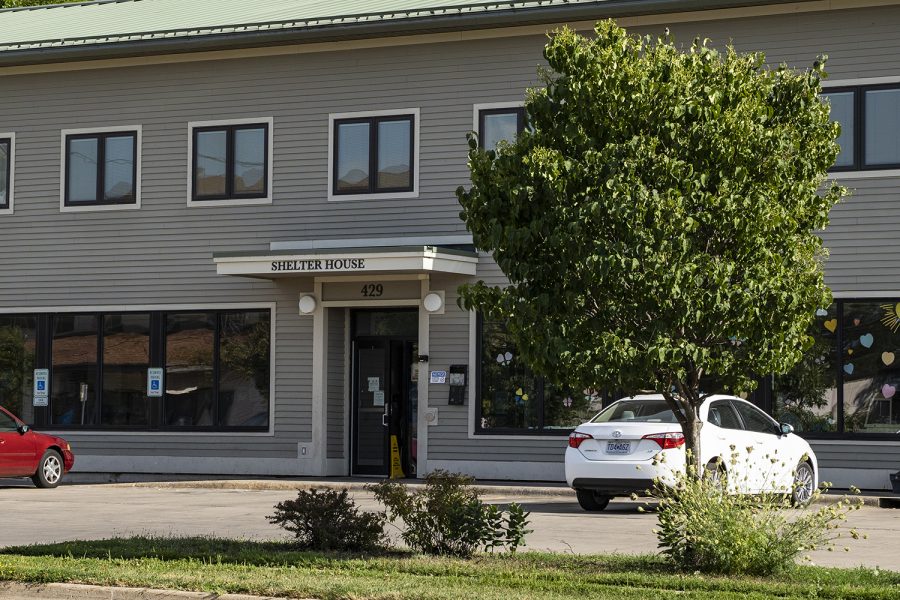Moratorium on eviction ends, Iowa City nonprofits seek to provide assistance to local renters
The federal moratorium on eviction has expired, but statewide and local programs are still providing aid to renters and homeowners who face a loss of income due to COVID-19.
The Iowa City Shelter House is seen in Iowa City on Wednesday, Aug. 5, 2020. (Shivansh Ahuja/The Daily Iowan)
August 5, 2020
The coronavirus pandemic has not created a housing crisis, but it has deepened existing inequalities and created more urgency around housing problems, said Sara Barron, executive director of the Johnson County Affordable Housing Coalition.
A national moratorium on evictions imposed by the Coronavirus Aid, Relief, and Economic Security (CARES) Act expired on July 24. About 43 percent of renter households nationally will be unable to pay rent and are at risk of eviction, according to numbers from Stout, a center for resources related to the eviction process.
Stout also estimates that 31.15 percent of Iowa renter households will be unable to pay rent and are at risk of eviction.
“Even before the pandemic, 51 percent of renters and 16 percent of homeowners [in Johnson County] were cost-burdened by their housing, meaning they were paying more than they could afford every month for their housing already,” Barron said, citing a report the coalition recently conducted on COVID-19 housing needs and solutions.
Some renters and homeowners are able to seek aid from Iowa’s COVID-19 Eviction and Foreclosure Prevention Program, though they must meet certain criteria. According to the Iowa Finance Authority, applicants must be current renters or homeowners at the risk of eviction or foreclosure due to COVID-19 related loss of income.
The loss must have occurred on or after March 17 and it must be documented. Additionally, household income may not exceed 80 percent of median family income at the time of application.
Until August 4, people receiving the weekly $600 federal employment assistance were not eligible for the program, but the federal assistance ended July 31 and people who had been receiving those benefits can now seek Iowa’s assistance program.
For those that do not qualify for the state’s Eviction and Foreclosure Prevention Program, they can seek assistance locally.
“Shelter House is administering the City of Iowa City’s Eviction Prevention program … It’s a tricky situation — landlords obviously have mortgages to pay and renters are obviously struggling to pay their bills,” Shelter House Director of Development Christine Ralston said. “So, the eviction-prevention program is an opportunity for anyone who was right at that edge and can show that they’ve had a loss of income that’s COVID related in any way that they can access either state funds, or city funds. So the city eviction-prevention program is for the purpose of filling in the gaps … where someone would be ineligible for the state funds.”
Ralston said it’s likely the end of some government aid would lead more people to seek out Shelter House’s services.
“We never know exactly what to anticipate, but it absolutely makes sense that as the additional $600 a week and federal unemployment benefits expired on the 31st and we know that even people who were doing okay and getting by because of unemployment insurance [will be in] a different situation now too,” she said. “So the combination of both of those ending is [a] pretty, pretty strong predictor that we will have a significant increase in desire and need for services.”
RELATED: Violation of Johnson County mask mandate to be punishable by simple misdemeanor
CommUnity Crisis Services already offered Housing Utility Assistance, and recently the City of Iowa City started providing community development block grants that they are using to provide assistance to households who have had a loss of income due to COVID-19, said Sarah Witry, director of services at CommUnity.
The money can be used to cover rent, mortgage, or basic utilities, Witry said.
This aid is only for people living in Iowa City, and they must be ineligible for the state’s program or have a bill not covered by the state’s program to receive assistance.
“Center for Worker Justice has been awarded Johnson County and city funds to help in situations where either of these city-funded activities with us or with Shelter House, where those programs maybe aren’t a good fit,” Witry said.
Barron said the Johnson County Affordable Housing Coalition would love to see temporary, monthly, income-based assistance in place at the federal level to provide stability.
“Right now, the systems mostly require that you’re already behind and facing the threat of eviction or instability before you can get help,” Barron said. “Obviously that’s not the most stable path forward.”
She is currently working on a one-stop-shop chart for renters to see what type of assistance is available to them based on their situation. When that is completed, Barron said she will share it through the coalition’s social media and with the organization’s nonprofit partners.
“Housing is one of the most basic needs that we have for our health and stability and housing has never been more important than it is right now,” she said. “It is absolutely imperative that we keep people safely housed through this pandemic and ultimately it’s up to each of us in Johnson County to look out for each other, and make sure that that happens.”




